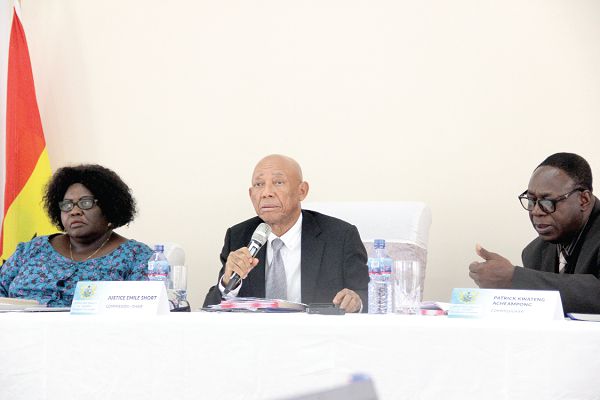The Justice Emile Short Commission of Inquiry tasked to investigate the violence at the Ayawaso West Wuogon by-election in January has rejected an application by Dominic Ayine to cross-examine some witnesses in the hearing.
Rejecting the application, chair of the commission Justice Short said granting the request would set a “dangerous precedent” in the work of commissions of inquiry.
Mr. Ayine who represents NDC parliamentary candidate Delali K. Brempong and Ningo-Prampram MP San Dzata George, filed his application to cross-examine other witnesses whose testimonies touched on his clients.
The lawyer and a former deputy Attorney-General expressed fears that the testimonies could lead to findings which could affect the political careers of his clients and, therefore, needed to be challenged.
But in the commission’s ruling, Justice Short said the rules on Commission of Inquiry Practice and Procedure gives the power to re-examine witnesses to the commission’s counsel.
He explained only a witness whose conduct is a subject of the inquiry can cross-examine another witness, something which he said Ayine’s clients were not.
He explained courts which allow cross-examination of both parties are different from commissions of inquiry.
The Emile Short Commission is merely investigative and therefore requires relying on witnesses whose supreme interest should be aiding the commission to present its findings and not protecting their own interest as they would in a court.
“In other words, the work of the commission, unlike that of a regular court, is not to decide what the balance of rights and liabilities are, between competing parties and the rules of evidence do not apply the same way”.
Emile Short said the Commission employs a lawyer to help it inquire from witnesses whereas in a court, a party uses a lawyer to defend a case.
Granting the request to cross-examine other witnesses, “may have the effect of converting the nature and ethos of the work [of the commission] into proceedings of defence of private rights”, the chair read.
This would “fundamentally disrupt proceedings of the Commission”, he ruled.
The former judge said any witness seeking to cross-examine other witnesses could supply questions to the counsel for the Commission to use for re-examination.
Accepting the ruling, Dr Ayine said the chair’s explanation of the Commission’s work shows that his clients must have no concerns that adverse finding would be made against them.
He noted his client Sam George could face expulsion from parliament if such findings were made while in the case of Delali K. Brempong, he could be disqualified from standing for a seat in parliament.
To learn from the Commission that no such career-killing findings would be made was comforting, he said.
The Commission’s work follows January 31, 2019 violence during what was expected to be a routine by-election in the Ayawaso West Wuogon constituency in the Greater Accra region.
In the ensuing violence, 15 were hurt and nine suspects were arrested as security operatives stormed a house of the NDC parliamentary candidate Delali Brempong, suspecting it held weapons.
It is a charge he has vehemently rejected at the Commission hearings. He has also rejected the narrative of the security officials, guns were fired from his house, triggering a response from a SWAT team.
The other narrative has been that pro-government militia group Invincible Forces dressed as national security operatives were used to harass voters.
Meanwhile, Mr. George says the country’s poor land tenure system has been partly blamed as the cause of the growing menace of party militia.
According to him, those who engaged in party militia activities are mostly land guards who become more active during the political season.
On his second day of testifying before the Commission he said fixing the land tenure system will end the phenomenon.
“That automatically drops the supply of these men who lend themselves to firearms and use them for other things.
“Once there is a decrease in that market, then whichever politician who has an interest in building a private army of some sort will not have the supply of men,” he said.
Mr Nartey George said an improvement in the system will mean people who want to acquire land will do the necessary search to know who owns the land, there will be no need for land guards.


Comments are closed.